
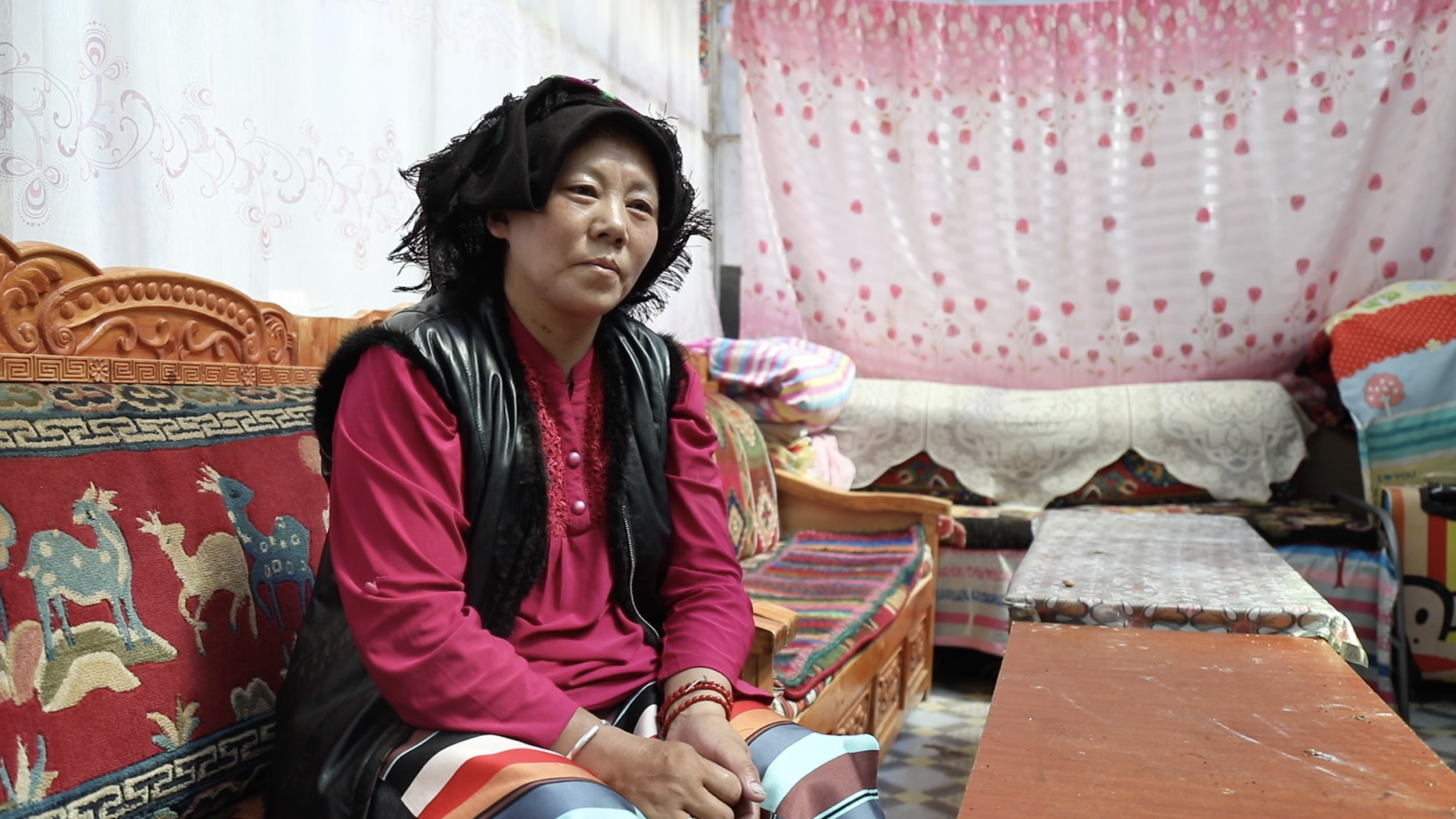
Bumu Riqu in an interview with CGTN. /Photo by Zhou Jinxi
If you think it’s no big deal being a single mom, try being a single mom of four without education or professional qualifications in a remote rural village of southwest China’s Tibet Autonomous Region.
Bumu Riqu is that woman.
"After my husband died, I was on my own with three kids in the schooling age, and all I had ever known was milking yaks," Bumu Riqu told CGTN.
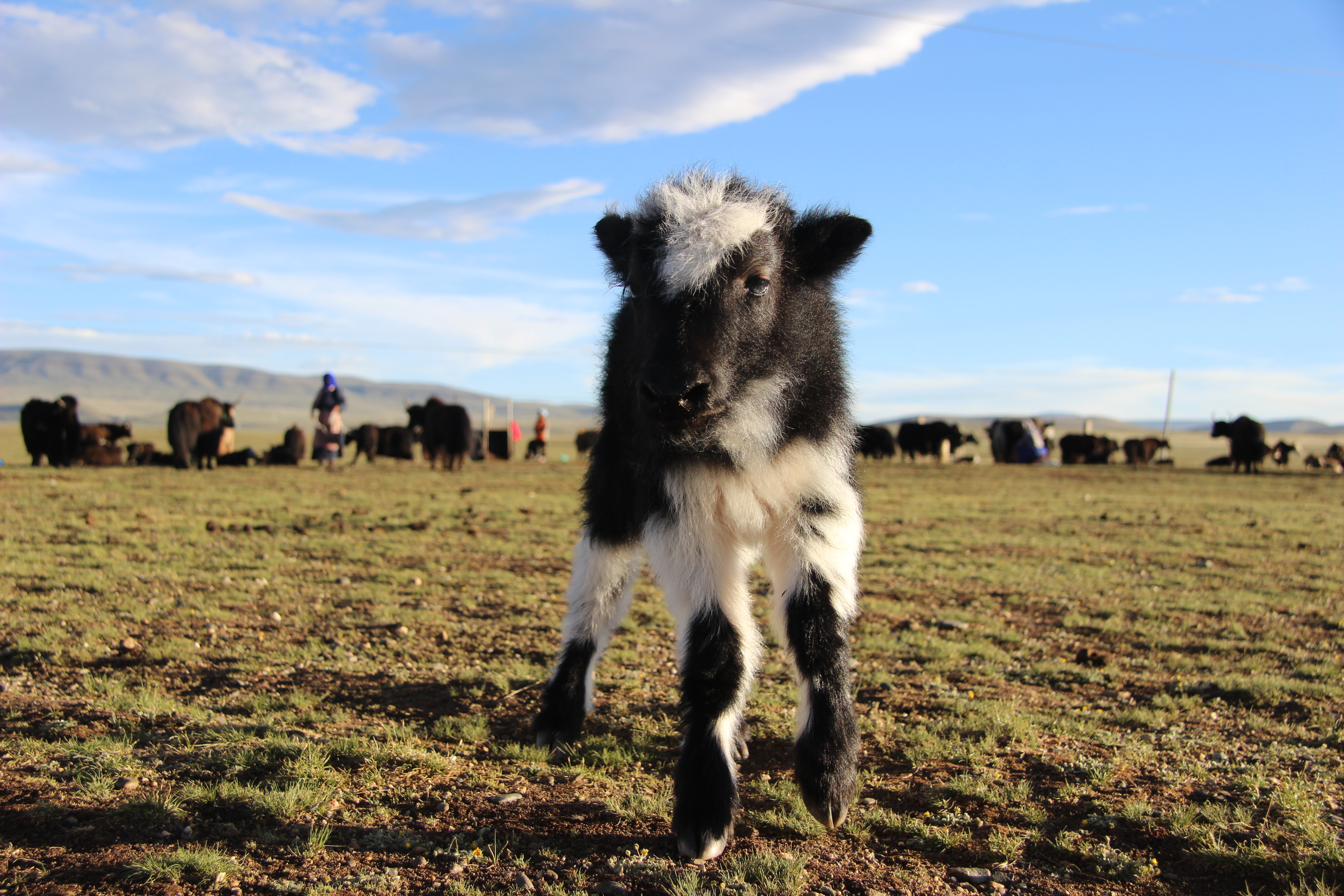
A yak calf in a pasture in the Nagqu Prefecture of southwest China's Tibet Autonomous Region. /Photo by Katrin Büchenbacher
Ripped out of rural idyll
The now 54-year-old spent her childhood living in the remote pasturelands of Amdo County, without having gone a single day to school. Like other farm girls at that time, Bumu Riqu was 19 when she got married. She gave birth to three children after many abortions.
She was 37 when her husband died in a motorcycle accident. As the man in the family, he had been the breadwinner, running the household and pulling all the strings. He had also decided that their only son would not go to school because they needed a strong hand on the farm.
"He told me what to do, where to go, and I would follow his lead," Bumu Riqu said.
With no one to call the shots after his death, her herd was neglected in the barn while she mourned her husband. There was no way she could have lived through that period without the help of neighbors and the local government, she said.
Eventually, the family ran out of food and money and was forced to abandon their rural idyll on the pastures. They moved to nearby Qiangma town, a settlement of about 8,000 residents. Recalling those hardships, Bumu Riqu does not hold back her tears.
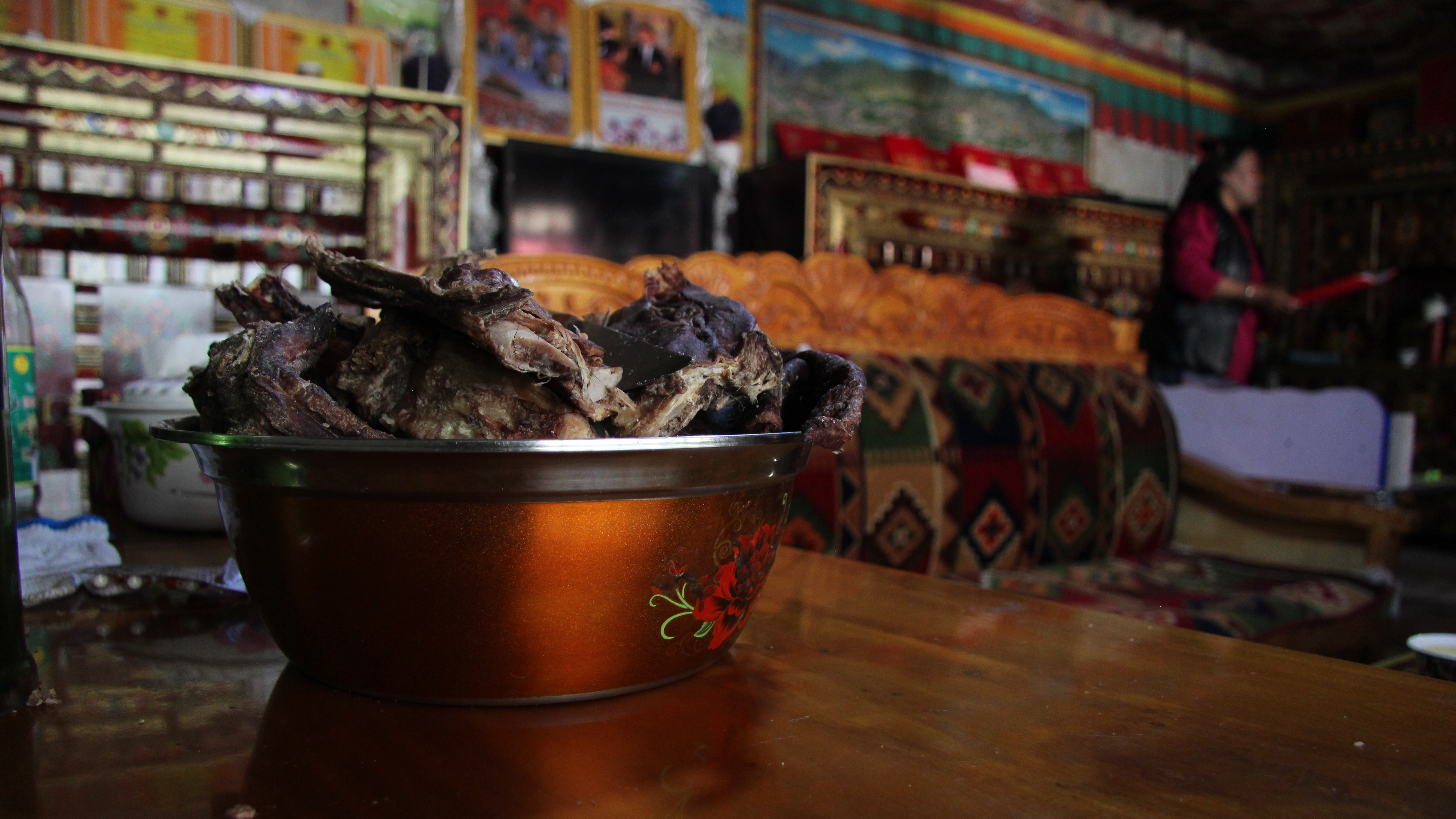
A bowl of boiled yak meat in Bumu Riqu's home in Qiangma town, Amdo County, Nagqu Prefecture of southwest China's Tibet Autonomous Region. /Photo by Katrin Büchenbacher
Cooperatives against poverty
China is dedicated to eradicating poverty by 2020. It’s a deadline that keeps local governments in disadvantaged rural areas busy and puts tremendous pressure on them to keep coming up with creative solutions or reproduce models that have been proven to be successful elsewhere. For China, the way to go is to boost industrial development.
Not an easy task in Tibet, whose dry alpine tundra climate and high altitude pose limitations to agriculture, which is still the primary source of livelihood in rural counties such as the Qiangma township in Amdo County, Bumu Riqu’s home.
One of the poverty alleviation models is a farmer’s cooperative. Members of such a co-op leverage the farming skills they already possess, for example, in animal husbandry, to build a business together. It’s one of the more than 10,000 projects running in Tibet since 2015. Together they represent a total investment of over 40 billion yuan, according to a government white paper on "Democratic Reform in Tibet," published in March 2019.
In traditional rural communities in Tibet, herding yak or sheep is often barely sufficient to keep one family above water without government aid.
Now, the goal of the co-op is to elevate this production mode to a higher level. Thanks to economies of scale, the herds are bigger and the product output larger so that each co-op member receives a salary from the agricultural products sold on the market. To launch the project, the government provides loans, subsidies and wages, but the idea is that once it is set up, it will be self-sufficient and even profitable.
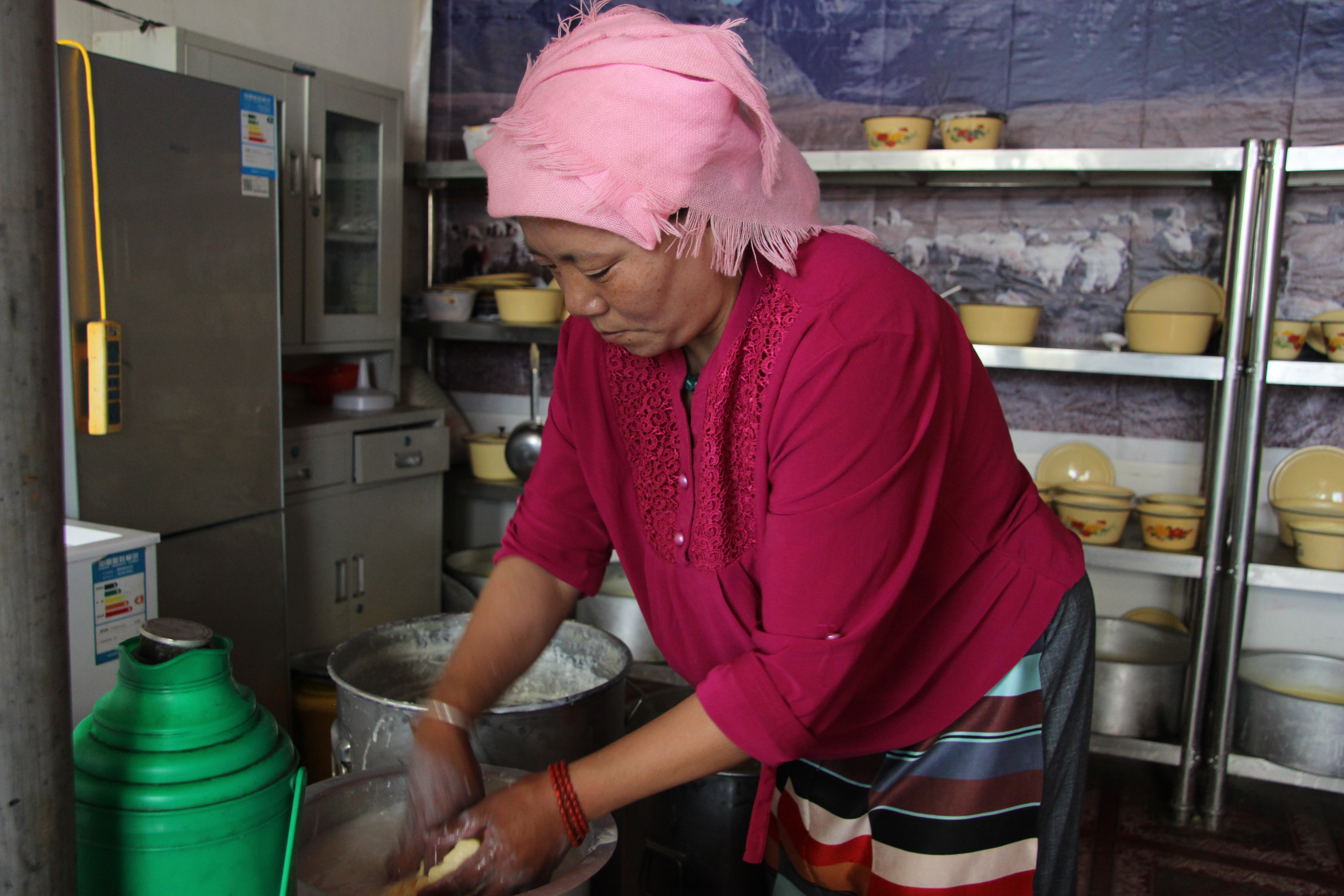
Bumu Riqu making butter in the workshop of the women farmer's co-op in Qiangma town, Amdo County, Nagqu Prefecture of southwest China's Tibet Autonomous Region. /Photo by Katrin Büchenbacher
Transforming skills into income
Bumu Riqu's hands and arms move in a steady rhythm as she kneads the butter that will later reach customers as far as Lhasa. She doesn't get distracted and routinely reaches for the water bowl nearby to rinse her hands as a new batch of fresh yak milk arrives in the workshop. She smiles as the woman hands her over the pot.
When Bumu Riqu arrived at Qiangma town, she had to find work to sustain her family.
She started by opening a small shop, which she later expanded to a tea house. She worked around the clock, and while her children received government subsidies for their education, she still counted among the working poor.
Bumu Riqu wasn’t the only woman in a precarious financial situation. Many of her peers were struggling to make ends meet, especially the widowed or those left by their men. Thus, the local authorities launched a co-op designated to provide work for women.
"Women are herding, milking, making butter and weaving tents in our pastoral areas, but we want women to have their own income and be self-sufficient and self-reliant," Ciwang Zhuoma, assistant minister at the PR department of Amdo County, told CGTN.
Things started to get better from there.
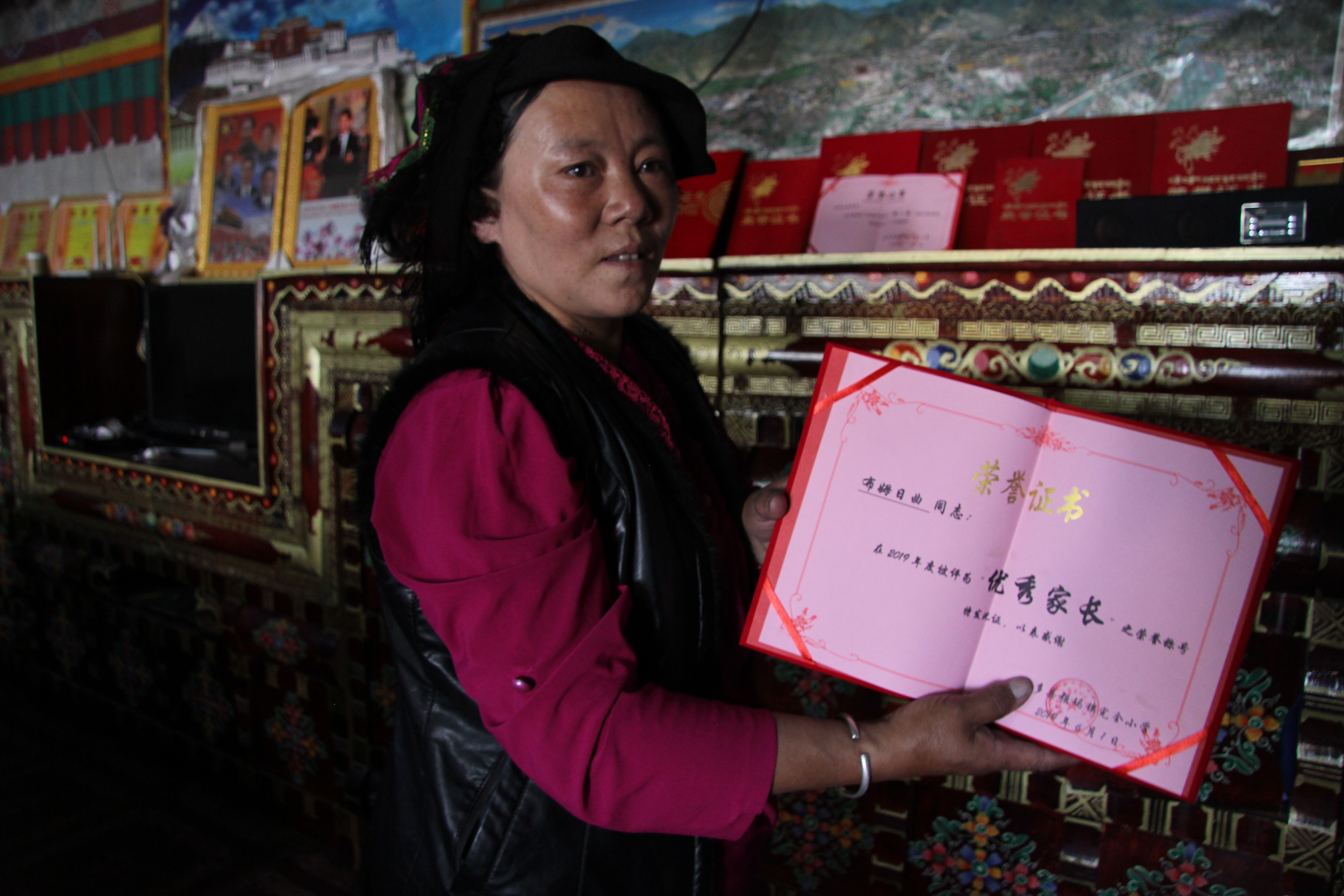
Bumu Riqu shows off an award she received from the local primary school for "Outstanding Parenting." /Photo by Katrin Büchenbacher
Education: Ticket to a better life
Bumu Riqu, once part of the co-op, was too busy to keep her tea house. Her hard work paid off, as she is now the manager of the group of women in Qiangma working at the co-op. With a big herd and retaining 100 percent of the co-op's profits, she can make about 3,000 yuan (about 436 U.S. dollars) in the summer months.
She even finds some free time, where she teaches herself reading using Tibetan Buddhist scriptures.
Both her daughters were able to go to college, with one opening up a motel in the bigger Bangga town. Her fourth child, a son from another relationship, is now 10 years old and a good student, she said.
"My biggest regret is not having sent my first son to school," she said, adding that even though he now has a house, family and a car in Lhasa, she can’t forgive herself for depriving him of an education she would have wished for herself.
Her son doesn't hold a grudge and invites her to retire comfortably in Lhasa, but she would only spend the winters there.
"I still want to work and not be a burden on my children," she said.
(CGTN's Zhou Jinxi contributed to this story.)

Copyright © 2018 CGTN. Beijing ICP prepared NO.16065310-3
Copyright © 2018 CGTN. Beijing ICP prepared NO.16065310-3